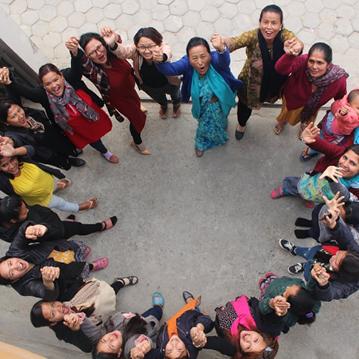“Worship leaders have a responsibility to teach by conversational example so that they move people beyond likes and preferences,” says Joyce Ann Zimmerman, who founded the Institute for Liturgical Ministry to help form ministers in the liturgical life of the Roman Catholic Church.
She recently presided over and preached at a Calvin Symposium on Worship vespers service. Afterwards, many people came up to comment on her preaching.
“Some said, ‘You touched me deeply for this reason’ or ‘I heard what you said about this and have to think about it more.’ Others said, ‘Oh, you preached so well.’ I came back with, ‘Yes, God is teaching us about…’ There’s a way to deflect a sincere compliment and move them beyond likes. If someone tells me they really liked a song, I ask, ‘How did it change you or help you understand something?’” Zimmerman says.
Pamela Green says that congregation-wide teaching about the meaning and purpose of teaching helped Ebenezer United Methodist Church in Miami move beyond thinking of worship as a collection of performances. Worshipers are starting to see themselves as participants united as witnesses to the gospel and change agents in the world.
“There was a time when each auxiliary ministry had its own mission statement. Now we’re talking about what we are willing to do or give up or help make happen for the good of the church, such as getting everyone’s buy-in to support the monthly youth service. We want to prepare our youth for kingdom building,” Green says.
“It’s become a mantra among all our ministry leaders to say, ‘We are not performers. We are ministers.’ When kids say, ‘Oh we’re performing such and such next Sunday,’ leaders say, ‘No, you’re leading,’” she adds.
She also demonstrates how to talk about feeling God’s presence in worship. “I’ve been a widow for two years. I heard ‘The Storm Is over Now’ on the radio and it really ministered to me. Then I go to church and see the dance ministry twirling to this song. So I told them how they ministered to me through that song.”
Green knew the repeated messages were sinking in when she asked a teen, “What will you do differently now that you’ve been to worship?”
“The young lady answered, ‘I just want to go out and do some good.’ Before it would have been, ‘I want to dance like she danced,’” she says.
Green has also begun using the POWR (plan, order, worship, reflect) model at monthly worship planning meetings. “This helps really infuse the Word in our worship planning. We’re really understanding that we ourselves—everybody—are ministers,” she adds.




